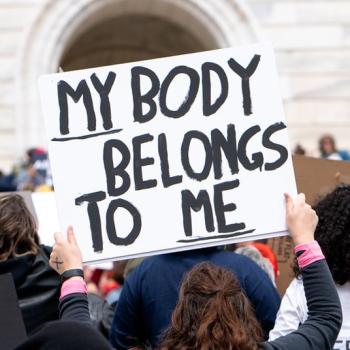Today’s exvangelical lecture is on the subject of heaven, hell, and how to qualify for permanent residence in either place.
I’ve been reading David Bentley Hart’s excellent book, “That All Shall Be Saved: Heaven, Hell, and Universal Salvation,” for the third time (Amazon description of the book is below – this is an unsolicited endorsement). It’s giving me flashbacks to my half-century as an evangelical, and my fervent hope (especially after embarking on an interfaith marriage) that we (i.e. evangelicals) were wrong about the doctrine of hell.
It was the one article of faith that I felt pretty sure God wouldn’t enforce strictly. I knew the doctrine well: it doesn’t matter how few or how minor your sins were – without Jesus’ saving death on the cross, hell is your destiny. BUT I believed that, when push came to shove in the sweet bye-and-bye, God wouldn’t send all those people (not me, of course) to eternal punishment. It’s just too…mean.

I suspect I’m not alone in this hope. David Bentley Hart expressed it perfectly: “maybe we don’t really believe in hell – we just believe that we believe in hell.”
Because if we really, really believed in eternal torture (think about it: eternal + torture!) for all who failed to invite Jesus into their hearts, we’d be out there constantly evangelizing, imploring our loved ones and strangers, weeping over every person whose life ended without the Sinner’s Prayer.
We would not waste precious time waiting in line at Starbucks, hitting the snooze button, binge-watching Netflix, or scrolling through social media (unless, of course, we are indifferent to the souls of others – which couldn’t possibly be the case).
But we do believe we believe in hell – at least enough to threaten people who don’t believe: “Watch out! On Judgment Day, God will say, ‘I never knew you.’ Don’t say you were never warned.”
Here’s what we don’t talk about:
- God, who created everything and is all-wise and supremely loving, set into motion a system in which failure was not only an option, but almost a certainty (if not Adam and Eve, eventually, someone in the human race would have eaten that fruit).
- As part of this wise and loving God’s system, that singular failure by two people resulted in every subsequent person on earth automatically inheriting the fundamental trait of sinfulness and its consequence, eternal damnation.
- The wise and loving God, in all his power, either would not or could not change this outcome.
- Consequently, the vast majority of the 100+ billion of people who have ever lived will – literally through no fault of their own – spend eternity in torment.
And we wonder why people don’t take us seriously.
(Commercial: if you question “business as usual” in Christianity – or want to question it – subscribe to my newsletter, and we can journey together!)
We say, “God gave us free will because he loves us. We can say yes to God, or we can say no. Because he loves us, God will give us what we freely chose: eternity in heaven with him, or eternity in torment without him.”
Here’s what we don’t talk about:
- This loving God seems to have a cruel streak. Eternal punishment is void of grace, mercy or any redemptive element.
- Eternal punishment is barbaric. Even the most abhorrent sinner – say, Hitler – could never deserve unending torment.
- No one in their right mind would choose eternal punishment. Humans with their mental faculties in place choose what seems best to them. Anyone who “rejects God” clearly does not understand what he/she is doing, or is not convinced about the truth of the message. These are not flaws deserving of eternal damnation.
- People who die never even hearing the Gospel don’t deserve damnation – we who were too lazy or busy to reach them should suffer their punishment in their stead.
- People who “reject God” because they were traumatized or abused by religious people don’t deserve damnation – those who inflicted the trauma or abuse should suffer the punishment of their victims.
- People who were raised in hopelessness, poverty, or addiction, and then go on to “reject God” because they feel he failed them, don’t deserve damnation – we who allowed those circumstances to exist ought to be punished.
- In short, if we have the Golden Ticket to heaven, but have denied others access by our words or actions, it’s not they who deserve hell – it’s us.
We say, “Your stance on Roe V. Wade reveals all that I need to know about where you stand with the Lord: if you support a woman’s right to choose, you are on the side of Satan, and regardless of your Sinner’s Prayer, I fear you may be going to hell.”
Here’s what we don’t talk about:
- It is not our business to determine how total strangers should live their lives.
- We are not only denying women their autonomy, but also refusing to make contraceptives readily available, making abortions more likely in America. We are thus putting millions of women (and babies) in the position of being traumatized – either by going through an abortion, or by raising a child/growing up in impossible circumstances – possibly rejecting God.
- We are saying in one breath that Jesus is the only way to salvation, and in the next that we have identified a political caveat in God’s plan.
- Our support for guns in classrooms, our support for wars, our support for Israel’s oppression of the Palestinian people, our failure to support assistance for the marginalized and healthcare for all – these positions must also say something about where we stand with the Lord. Perhaps we need to set our own houses in order.
Is all of this blasphemy? Or is it an honest criticism of a man-made doctrine that neither Jesus nor the New Testament authors taught? (Hint: if you’re thinking, “of course they taught it,” think again. Or take the challenge and read David Bentley Hart’s excellent book, “That All Shall Be Saved: Heaven, Hell, and Universal Salvation.“)
And if our theologians have missed the boat on this, is it possible that they’ve missed the boat elsewhere too?
(If you are energized by challenges to the evangelical status quo like this, you’d enjoy my blog. Sign up for my free newsletter here!)
(If you would like to comment, please pop over to my Facebook page. All of my posts are there and open to constructive comment! I welcome your thoughts. And don’t forget to subscribe to my newsletter!)
OTHER GRACE-COLORED GLASSES POSTS ON HELL AND ETERNITY:
- Let’s talk about eternity for a minute – Pt 1, Good Samaritan
- Let’s talk about eternity for a minute – Pt 2, sheep and goats
- Will the “unreached” go to heaven? – Part One, an evangelical answer
- Will the “unreached” go to heaven? – Part Two, a ruthless God
- Is God’s grace bigger than we think?
- The inclusivity of heaven – according to Jesus
Description of “That All Shall Be Saved: Heaven, Hell, and Universal Salvation” by David Bentley Hart:
A stunning reexamination of one of the essential tenets of Christian belief from one of the most provocative and admired writers on religion today.
The great fourth-century church father Basil of Caesarea once observed that, in his time, most Christians believed that hell was not everlasting, and that all would eventually attain salvation. But today, this view is no longer prevalent within Christian communities.
In this momentous book, David Bentley Hart makes the case that nearly two millennia of dogmatic tradition have misled readers on the crucial matter of universal salvation. On the basis of the earliest Christian writings, theological tradition, scripture, and logic, Hart argues that if God is the good creator of all, he is the savior of all, without fail. And if he is not the savior of all, the Kingdom is only a dream, and creation something considerably worse than a nightmare. But it is not so. There is no such thing as eternal damnation; all will be saved.
With great rhetorical power, wit, and emotional range, Hart offers a new perspective on one of Christianity’s most important themes.
FEATURED IMAGE: “Heidely-ho Satan!” by Frenkieb is licensed under CC BY 2.0.













